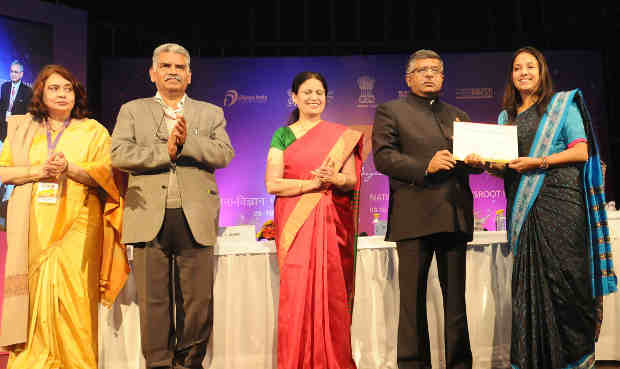Can NIC Help India Take Lead in Digital Revolution? No Way.

Ravi Shankar Prasad at the inauguration of the National meet of District Informatics officers on “Vision insight and voice as India goes digital”, in New Delhi on February 08, 2018
The Indian IT minister fails to understand that NIC is almost a defunct organization which must be immediately shuttered.
By Rakesh Raman
If wishes were horses, beggars would ride. Perhaps India’s IT minister – who is clueless about IT – does not understand this proverb.
While India is tottering at the bottom of the technology pyramid of the world, minister Ravi Shankar Prasad said Thursday that India should take lead in digital revolution.
He suggested that National Informatics Centre (NIC) – a white elephant owned and operated by Indian government – should support efforts aimed at making India a low-cost cyber security hub. This is an absurd expectation, as India continues to stay in the group of technologically challenged countries.
The new Digital Evolution Index (DEI) – which has analyzed the state and rate of digital evolution in 60 countries – has placed India in the “Break Out” category and clubbed it with laggard countries such as Bangladesh, Kenya, Morocco, and Indonesia. Break Out countries are low-scoring in their current states of digitalization.
Worse, India’s rank (53) is the lowest among BRICS (Brazil – 46, Russia – 39, India – 53, China – 36, and South Africa – 43) nations.
Role of NIC
The minister said NIC being the back-bone of technology should not only innovate new products for betterment of their own states / districts but also hand-hold the local citizens in becoming familiar with new technology. The minister fails to understand that NIC is almost a defunct organization which must be immediately shuttered.
[ Fault Lines: A Research Report on the Quality of Education in Delhi Schools ] – Download
Set up in the year 1976 to make India a tech-driven country, NIC was supposed to introduce computerization in government departments. But despite its mammoth size and after wasting huge public money, NIC kept buying and distributing computers while computerization has always been missing.
It was a totally flawed concept right from the beginning because Indian government departments are “owned” by the gangs of shady politicians and naive bureaucrats who run these departments as their personal property. Why would they share any control with NIC-supplied computers? They won’t; and they didn’t.
No e-Governance
As a result, NIC kept squandering public money worth thousands of crores of rupees (or billions of dollars) in the name of e-governance projects, but the poor Indian citizens have yet to see any governance, let alone e-governance. Even a layperson can see NIC’s shoddy work that it has done in the Indian government departments.
For example, when the world has moved to advanced technologies like Responsive Web Design (RWD) and the next-generation Collaborative Web, most government websites (even NIC’s own website) are using static web techniques that emerged and went obsolete in the 1990s. There are hardly any e-governance or citizen services being delivered through these sites, which don’t even get updated.
NIC’s thousands of employees who are like digital parasites could never stay up-to-date with their skills in the fast-moving tech arena and today they look like some primitives from the Stone Age trying to survive in the Digital Age. They lack communication skills, they lack presentation skills, and, strangely, they lack tech skills.
Strangely, the IT minister expects this bunch of digital dunderheads to supplement the government efforts for making citizens literate in technology. That is not possible.
Meanwhile, NIC has introduced two new portals – ‘Centre of Excellence for Application Security’ (CoEAS) and ‘Secure, Scalable & Sugamya Website as a Service’ (S3WaaS) – which were launched by minister Ravi Shankar Prasad.
By Rakesh Raman, who is a national award-winning journalist and social activist. Besides working at senior editorial positions with leading media companies, he was writing an exclusive edit-page tech business column (named Technophile) regularly for The Financial Express (a daily business newspaper of The Indian Express Group).
Earlier, he had been associated with the United Nations (UN) through United Nations Industrial Development Organization (UNIDO) as a digital media expert to help businesses use technology for brand marketing and business development. He also runs a free school for deserving children under his NGO – RMN Foundation.











